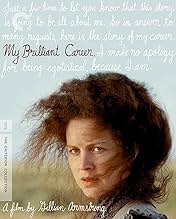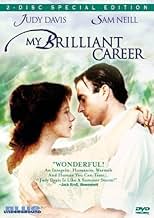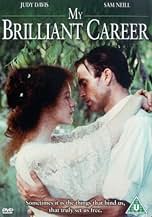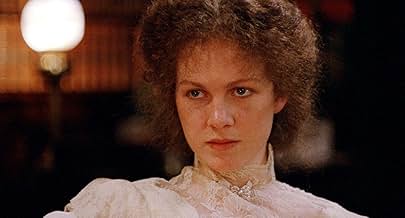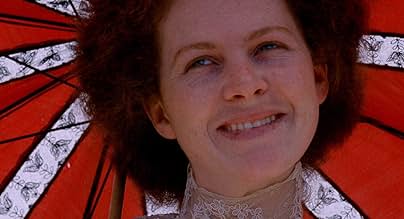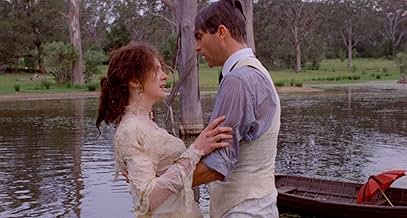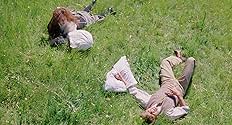IMDb RATING
7.1/10
5.1K
YOUR RATING
A proud young woman in early 20th century Australia must choose between marriage and independence.A proud young woman in early 20th century Australia must choose between marriage and independence.A proud young woman in early 20th century Australia must choose between marriage and independence.
- Nominated for 1 Oscar
- 11 wins & 8 nominations total
- Director
- Writers
- All cast & crew
- Production, box office & more at IMDbPro
Featured reviews
It's 1897 rural Australia. It's rough living in a patriarchal society. Sybylla Melvyn (Judy Davis) has many big dreams. She wants a grand career rather than a marriage. Her mother tells her that they can't keep her anymore. She is sent away to live with her rich grandmother. She is excited at first by the change. She is soon pursued by the Frank Hawdon (Robert Grubb) and childhood acquaintance Harry Beecham (Sam Neill). She refuses to be married off. She grows closer and closer to Harry.
These are two great young Aussie actors. The story meanders a bit. My best comparison is Anne of Green Gables without the humor. Without the humor, Sybylla comes off a little more huffy. Judy Davis is a very appealing actress. The back and forth in the romance is quite compelling. It's an empowering story and there's also the acting. The cinematographer is also great.
These are two great young Aussie actors. The story meanders a bit. My best comparison is Anne of Green Gables without the humor. Without the humor, Sybylla comes off a little more huffy. Judy Davis is a very appealing actress. The back and forth in the romance is quite compelling. It's an empowering story and there's also the acting. The cinematographer is also great.
10wse
My mother took me to see this film when I was ten, the year before she died. It changed my entire perspective on the world, set me free from the constraints of fairy tales and inspired me to do something worthwhile with my life (write). I've seen it a few times since then, and found it improved in pace with my understanding.
Apparently Judy Davis didn't like this character or sympathize with her. All I can say is that I'm glad she went ahead and took the role anyway. Sybylla is like Cinderella with a twist worthy of M. Night Shymalan.
The film is sometimes beautiful and lyrical, sometimes depressing and ugly. At all times it is believable because the forces driving Sybylla transcend time and place: creativity and independence. This film taught me that a gilded cage is still a cage.
Even twenty odd years after I first saw it, this film makes me want to cheer. Gillian Armstrong, if you're out there, thank you!
Apparently Judy Davis didn't like this character or sympathize with her. All I can say is that I'm glad she went ahead and took the role anyway. Sybylla is like Cinderella with a twist worthy of M. Night Shymalan.
The film is sometimes beautiful and lyrical, sometimes depressing and ugly. At all times it is believable because the forces driving Sybylla transcend time and place: creativity and independence. This film taught me that a gilded cage is still a cage.
Even twenty odd years after I first saw it, this film makes me want to cheer. Gillian Armstrong, if you're out there, thank you!
I watched this movie expecting to be bored stiff, but was pleasantly surprised! This genre of film-making I usually find no interest in, but this one proved to be different. It was well written, well directed, very well acted, and the chemistry between the players was incredible! Very rarely do I view a movie that has a perfect combination of actors, and this was one. Judy Davis and Sam Neill were incredible together, and I'm happy to say they would be in two other films together after this one. Everything about this movie was wonderful. It's just too bad it ends when it does. I found myself very interested in the characters, and wanted to know what became of each. My only qualm with the movie is that it ended too fast! I would definitely have to call this a favorite! That's how good this movie is!
Usually I'm not too interested in these kinds of films, but i found myself becoming involved in the characters and their lives. The movie was very well done, and it explores many of the social gender roles that are still applicable today.
It is a funny, yet serious movie, that has some deep undertones.
I would recommend watching it.
It is a funny, yet serious movie, that has some deep undertones.
I would recommend watching it.
Sometimes a life in film brings an experience like this. Its oddly tense in some dimensions and relaxed in others and the balance between the two seems distinctly Australian. I hadn't seen this when it was new, and I'm glad. Seeing a great film for the first time is a distinct pleasure.
I can think of only two similar pleasures in life.
Reviewers often focus on the story; its the common currency for discussion. The interesting fact behind the power of this movie is that the story is incoherent, poorly developed. There are a few main characters and none of them are attached to what are considered necessities for storytelling. They aren't introduced, we see them only through the effect of their presence. They don't develop. They influence nothing.
The main character is presented as a sort of Jane Austen both an Austen woman encouraged to marry, and Austen herself as a sort of author-in-her-own-book, like we saw in the 1999 film of Mansfield Park. But the odd thing is that we have Austen in Australia, the role and all the expectations without the baroque mechanics of society swirling around. Instead we get cows and sheep.
And emptiness, a cinematic vastness that even the US hasn't yet produced, despite Terence Malick.
So the incompleteness of the story is part of the genius of the thing. Our heroine doesn't have an Austenian future, instead becomes a backcountry Louisa May Alcott or George Sand. Indeed, Davis did go on to play Sand and Anderson went on to direct "Little Women." What our filmmaker has done is create a story where we subconsciously notice something is missing. And then she fills it with two things, this translucent actress and a similarly translucent open landscape.
First the landscape. Watch the opening of this. Its genius, shooting from outside in, peering in through windows and doors while we see literally the story beginning to be written. Then we shoot from the inside through the same windows out and see a dust tempest beginning.
This notion of space, inadequate enclosure, book and heroine conflated into them and weaving through them was copied after a fashion in the opening for the 2005 "Pride and Prejudice." Here, it is fresh, original, shocking. Effective, even life-affirming.
You can see a similar master vision in how the ending is shaped. We see our woman, a best friend by this time, going to mail her book to us. She approaches the fence and her dog scurries under, unconstrained by fences. Its a small thing, but by then we've become aware of how wonderfully our hidden woman behind the camera has shaped everything so minutely. That dog moves under the gate naturally, using a gait and hole that can only have come through hundreds of such exits. I have no idea how Anderson did it.
And now to Ms. Davis. Over time you pick things from the film vocabulary that you cleave to, things that naturally tip into the bucket of your soul. One of these for me is a certain type of folded acting I've noticed in Australian actresses. Blanchett, Winslet are the ones I follow deeply.
But you can see it here and I imagine that this is the first appearance of the style in a competent film. In my own historiography, Judy Davis invented it and does so here. If you watch her manner, you can see Cate. The style is what I call folded, where we get both the character and a higher level communication from the actor about the character.
We have a few folded actresses. What's even rarer is when the actress is intelligent and skilled enough to place that higher fold in the center of the filmmaker's intention. It happens here. Its beautiful, on a simpler level echoing the fact that we see a book, its making, and various considerations about the making of the book.
Because it is this sort of translucent folding, we see Cate when we see Judy.
You won't soon forget that.
I'm putting this on my list of films you really must see. Readers may be shocked. I only allow myself two from any given years and this year gave us "Alien," "Apocalypse Now," "Manhattan," and "Tree of Wooden Clogs," all of which are bumped by this. But this will change you, a female Herzog, unHerzog.
Now if I can only see "High Tide."
Ted's Evaluation -- 4 of 3: Every cineliterate person should experience this.
I can think of only two similar pleasures in life.
Reviewers often focus on the story; its the common currency for discussion. The interesting fact behind the power of this movie is that the story is incoherent, poorly developed. There are a few main characters and none of them are attached to what are considered necessities for storytelling. They aren't introduced, we see them only through the effect of their presence. They don't develop. They influence nothing.
The main character is presented as a sort of Jane Austen both an Austen woman encouraged to marry, and Austen herself as a sort of author-in-her-own-book, like we saw in the 1999 film of Mansfield Park. But the odd thing is that we have Austen in Australia, the role and all the expectations without the baroque mechanics of society swirling around. Instead we get cows and sheep.
And emptiness, a cinematic vastness that even the US hasn't yet produced, despite Terence Malick.
So the incompleteness of the story is part of the genius of the thing. Our heroine doesn't have an Austenian future, instead becomes a backcountry Louisa May Alcott or George Sand. Indeed, Davis did go on to play Sand and Anderson went on to direct "Little Women." What our filmmaker has done is create a story where we subconsciously notice something is missing. And then she fills it with two things, this translucent actress and a similarly translucent open landscape.
First the landscape. Watch the opening of this. Its genius, shooting from outside in, peering in through windows and doors while we see literally the story beginning to be written. Then we shoot from the inside through the same windows out and see a dust tempest beginning.
This notion of space, inadequate enclosure, book and heroine conflated into them and weaving through them was copied after a fashion in the opening for the 2005 "Pride and Prejudice." Here, it is fresh, original, shocking. Effective, even life-affirming.
You can see a similar master vision in how the ending is shaped. We see our woman, a best friend by this time, going to mail her book to us. She approaches the fence and her dog scurries under, unconstrained by fences. Its a small thing, but by then we've become aware of how wonderfully our hidden woman behind the camera has shaped everything so minutely. That dog moves under the gate naturally, using a gait and hole that can only have come through hundreds of such exits. I have no idea how Anderson did it.
And now to Ms. Davis. Over time you pick things from the film vocabulary that you cleave to, things that naturally tip into the bucket of your soul. One of these for me is a certain type of folded acting I've noticed in Australian actresses. Blanchett, Winslet are the ones I follow deeply.
But you can see it here and I imagine that this is the first appearance of the style in a competent film. In my own historiography, Judy Davis invented it and does so here. If you watch her manner, you can see Cate. The style is what I call folded, where we get both the character and a higher level communication from the actor about the character.
We have a few folded actresses. What's even rarer is when the actress is intelligent and skilled enough to place that higher fold in the center of the filmmaker's intention. It happens here. Its beautiful, on a simpler level echoing the fact that we see a book, its making, and various considerations about the making of the book.
Because it is this sort of translucent folding, we see Cate when we see Judy.
You won't soon forget that.
I'm putting this on my list of films you really must see. Readers may be shocked. I only allow myself two from any given years and this year gave us "Alien," "Apocalypse Now," "Manhattan," and "Tree of Wooden Clogs," all of which are bumped by this. But this will change you, a female Herzog, unHerzog.
Now if I can only see "High Tide."
Ted's Evaluation -- 4 of 3: Every cineliterate person should experience this.
Did you know
- TriviaJudy Davis learned the piano for her role in this film and played her own piano solos. Davis is credited for piano playing in the closing credits.
- Quotes
[first lines]
Sybylla: Possum Gully, Australia. 1897. Dear fellow countrymen, just a few lines to let you know that this story is going to be all about me. So, in answer to many requests, here is the story of my career... here is the story, of my career... my *brilliant* career. I make no apology for being egotistical... because I am!
- ConnectionsFeatured in My Brilliant Career: Ciné Regards - Judy Davis (1980)
- How long is My Brilliant Career?Powered by Alexa
Details
- Release date
- Country of origin
- Language
- Also known as
- My Brilliant Career
- Filming locations
- Production companies
- See more company credits at IMDbPro
Box office
- Budget
- A$800,000 (estimated)
- Runtime1 hour 40 minutes
- Sound mix
- Aspect ratio
- 1.85 : 1
Contribute to this page
Suggest an edit or add missing content



